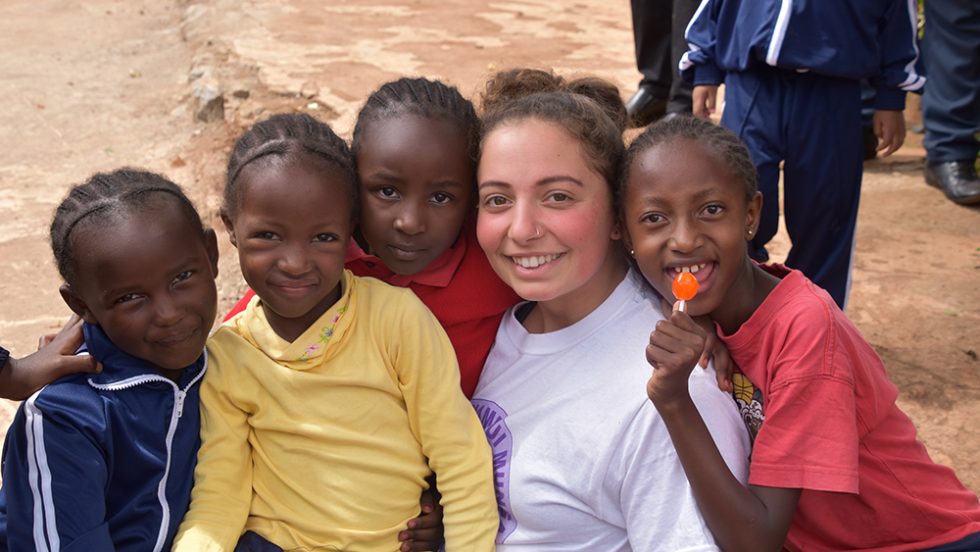
Adelphi University sent its first study-abroad group of students and professors to Africa.
Adelphi has been home to many faculty members and students from Africa. And this year, the University organized its first formal study abroad trip to the continent.
The faculty-led program was headed by Anne Mungai, PhD, then special assistant to the provost and Adelphi’s newly appointed associate provost for strategic initiatives and graduate studies, and Esther Kogan, EdD, visiting associate professor and director of the Scholar Teacher Education Program (STEP) at the Ruth S. Ammon School of Education. Under their guidance, 16 graduate and undergraduate students from the College of Education and Health Sciences, the College of Nursing and Public Health, and the School of Social Work spent 12 days in the East African country as part of a 1-credit course. The students visited and carried out their service learning at the Caroline Wambui Mungai Foundation at Wangige in the Kenyan capital, Nairobi.
“We had to limit the number of students because we had so many who wanted to go,” said Dr. Mungai, who is a native of Kenya. “Many of these students have never been out of the U.S. They’d never been to Africa, so this was a real experience for them.”
The trip to Kenya was both a cultural and academic experience for the Adelphi students, who led lessons and discussions with the children at the orphanage based on their individual fields of study.
“We wanted the students to experience being in another culture and, at the same time, be in the classroom to see what happens in a classroom outside of the country,” Dr. Mungai said. “That’s why service learning is important: to teach the students to give back to society—that we don’t live for ourselves, we live for the community.”
A Study Abroad Success Story
As is often the case for anyone visiting another country for the first time, Dr. Mungai said some of the students seemed unsure about how they were going to fit in. After the first day or two of uncertainty, however, the students began to be at ease.
“I started seeing some of the students who were not sure start to interact with the kids,” Dr. Mungai said. “They played a lot of outdoor games with the kids, [and did] a lot of music and art. They went to the local market and we ate lunch at a local restaurant in the suburbs. They really fit in. They were not afraid.”
By the end of the service period, the Adelphi students and the children at the orphanage had developed a deep bond. “On the Friday we were leaving [Kenya], my own students were crying and the students at the home were crying,” Dr. Mungai said.
In written feedback, one of the students said: “Leaving was by far the hardest part on this trip. …I hope in the future to go back and help.”
Experiencing Kenya
The trip was not just limited to the classrooms. The nursing students visited local clinics to see, firsthand, Kenyan healthcare practitioners at work. The students also visited a giraffe center and elephant orphanage where rescued elephants, mostly babies, are cared for until they are old enough and strong enough to return to the wild.
Dr. Mungai also took the students to the Rift Valley, which runs from Kenya to neighboring Tanzania, and to the Maasai market, where traditional Kenyan artifacts and souvenirs are sold. “They loved it,” she said, adding that students were particularly intrigued by the haggling between traders and shoppers.
The students also visited Bomas of Kenya, a tourist village where they were treated to cultural dances and acrobatics displays.
With the maiden trip to Africa now locked in, Dr. Mungai said Kenya becomes the latest addition to countries for study abroad.
“Next year, we’re leaving on January 2. We already have a date,” she said. “We want to make sure that our students become global citizens before they finish school. There are things you can’t learn from a book, things a professor will not tell you until you go there and experience it.”
With the remarkable opportunities presented to students who study abroad, Dr. Mungai would like to see more opportunities for Adelphi students to get out of their comfort zones by studying abroad in non-European countries, experiencing different cultures and becoming “real global citizens.”
She said, “Our students are going to be the CEOs soon, but if they don’t learn about other cultures, they’re going to not treat people fairly because they really don’t know anything about them.” She added that studying abroad would also help domestic students connect with the international students on campus.